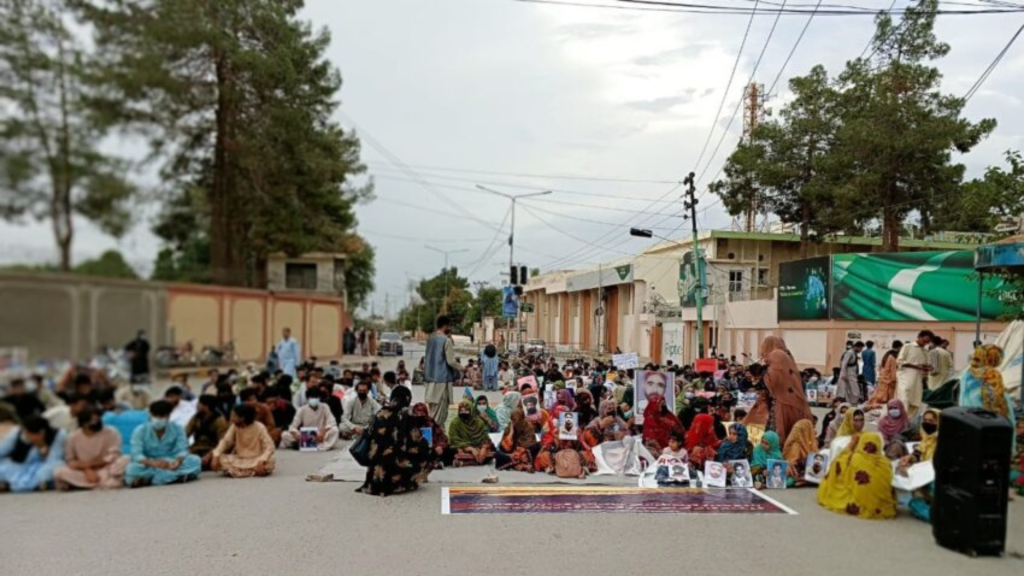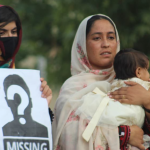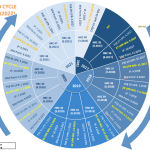Families of missing persons protest against extrajudicial executions in Balochistan. Photo: social media
Human rights violations continued unabated in August 2022, besides disastrous torrential rains and devastation caused by flood, killing more than two hundred persons in Balochistan. Human Rights Council of Balochistan (HRCB) documented at least thirty-nine cases of enforced disappearances and thirty cases of killings. Killed people include three women. Moreover, the sit-in protest of the families of missing persons in front of the governor’s house surpassed a month despite heavy rains and catastrophic flash floods throughout the province.
The families of victims of enforced disappearance continued their sit-in protest in front of the CM and governor’s house in extreme weather conditions, throughout the month. They are persistent on three demands; forming a judicial commission on the Ziarat massacre, assurance that no more victims of enforced disappearance would be killed extra-judicially, and access to the information of the disappeared persons. However, the Chief Minister formed a judicial commission, stating that the formation of the judicial commission is to wash away the blame on security forces, and regarding the other two demands, he said that he has no authority over resolving the cases of enforced disappearance. This protest was started after the extrajudicial execution of eleven missing persons by the army in a fake encounter in July.
The disastrous torrential rains and flooding have devastated the entire Balochistan, affecting 31 out of 34 districts of the province. More than 250 people died, communication networks broke down, livestock drowned and settlements were completely swept away. The remaining three districts, where farms and date trees are the only economic means, are also severely affected. These unprecedented fatal floods have significantly mounted food, health, and shelter crisis. So far, many countries and humanitarian agencies have provided millions of dollars of aid to help the flood-hit people, but the situation of the victims is getting worsened day by day. The victims have expressed dissatisfaction with the mishandling of the relief aid and the unfair distribution of aid by the provincial government.
The locals have blamed the government agencies for corruption, claiming that the responsible agencies are selling the ration, allocated for the victims.
People in some districts complain that they need food but are abandoned at the mercy of God. While some people in other districts claim that they are receiving 4 to 5 days’ food at once and they don’t have a place to store them as their belongings have completely drowned in the water. Thus, they have to eat that spoiled food for many days.
In some parts, the delivery of aid is being delivered by helicopters. They throw the packets from a high altitude which damaged the packets beyond the extent of use. The locals reacted to these actions of the government, calling them “disrespectful” and “insulting” to the affected and poor people who are in a dire need of humanitarian aid.
Moreover, the rescue teams are active in a few districts with a very limited number of relief workers. The locals are voluntarily going to remote areas and mountainous terrain to help rescue people.
The post-flood waterborne diseases have affected almost the entire province. People don’t have access to clean drinking water, medical attention, hygiene kits, sanitation, tents, and other essential items. Some locals say that the lack of tents has threatened the safety of women and increased the risk of harassment in the open air.
We are seriously concerned about a more devastating situation ahead in Balochistan, considering the aforementioned humanitarian crisis and the provincial government’s irresponsible approach to disaster management.
Enforced Disappearances:
In August, the security forces of Pakistan forcibly disappeared at least thirty-nine persons including five students, a professor, a human rights activist, and two lawyers.
Twenty-four people were forcibly disappeared by the Frontier Corps and eleven by Police’s counter-terrorism department CTD. Whereas, the police force accompanied by personnel of Intelligence agencies abducted and disappeared four people.
On Aug 01, Pakistani armed forces raided a house in Kadkocha, Mastung, and abducted two brothers, Noorullah Shahwani, a laborer, and Kaleemullah Shahwani, a student in a Madrasa. Noorullah was a previous victim of enforced disappearances who was in the custody of the Army for the last 9 months. He was released 20 days ago.
On Aug 02, the police counter-terrorism department CTD and military intelligence agency raided the house of Haji Sanaullah Shahwani in Jungle Road of Kharan and abducted three sons of him, Imran Shahwani, Amir Shahwani, and Irfan Shahwani. During the raid, forces indiscriminately opened fire and injured Imran and Amir, and abducted all three brothers. Later, forces left both at the Trauma Centre Quetta where both brothers succumbed to injuries. Whereas, the whereabouts of Irfan Shahwani is still unknown.
On Aug 08, Pakistani forces detained Maqbool from the Joint Road area of Quetta and shifted him to an unknown location. Maqbool is a resident of the Killi Ismail area of Quetta.
The same day, two people were abducted from Karachi. Ali Aajiz son of Omid Ali, a resident of Awaran, was abducted by the Intelligence agency. Ali has had hepatitis for a very long time and he was often visiting Karachi for his treatment. While Khudabakhsh son of Dr. Ghafoor, an artist, was abducted during a raid on his house from Lyari.
Separately, six persons were forcibly disappeared from two different places of Turbat by the forces. Three people, identified as Akhtar Malang, Ahmad Malang, and an elderly man, Ghulam Char Shambay were whisked away during a raid in the Gokdan area of Turbat while three others, named Abbas son of Ali, Shahdad son of Haji Azeem, and Sagheer Aslam son of Muhammad Aslam were abducted from Pathan Kahoor. The others were released while the whereabouts of Ahmad and Sagheer remain undisclosed.
On Aug 10, CTD raided a house in the Kariz Sur area of Mastung, and forcibly disappeared Nauman, Nadeem, and Shahid Hussain. Among the abductees, Shahid Hussain was shot and taken away injured.
On Aug 12, four shepherds were detained and later disappeared by Pakistani forces from the mountainous area of Zain Koh in the district Dera Bugti. The victims were identified as Ali Dad and Ali Jan sons of Wasu Bugti, Ghousho son of Leila Bugti, and Bijli son of Shahnawaz Bugti.
The same day, Sheikh Ayaz, leader of Jamiat Ulema Islam, and a resident of Tagran was abducted from a hotel in Lyari, Karachi. According to sources, he often visited Karachi for his treatment of Blood Cancer.
On Aug 15, the security forces raided a house in the Shikari Goth area of Jhao, Awaran, and detained Islam son of Huzoor Bakhsh, Azam son of Jameel, and Yasin son of Rahim Bakhsh, and shifted them to an unknown location. According to local sources, the army had intensified its operations and additional patrols were conducted in the area five days before the raid. Sources also claim that the forces are demanding people to guarantee the presence of every person from every household to an officer in the army camp. Personal information of the people in the area is being collected as well.
On the other hand, forces raided the Pullabad area of Tump, district Kech, and detained a young man identified as Mohsin son of Abdul Samad.
On Aug 22, the forces detained ten people from the coastal city of Gwadar and moved them to an undisclosed location. The victims were identified as Sahil Amin, Sameer Hamza, Balach Haji Sulaiman, Muzamil, Kachkol, Ali Jumma, Ehsan Faqir Muhammad, and Farooq Maula Bakhsh. Muzamil, Kachkol, and Farooq were later released, whereas the rest are still missing.
On Aug 24, Maula Bakhsh son of Wahab Kurd, a resident of Mach, was taken into custody by the personnel of Frontier Corps from Mach railway station and abducted. He is a coal miner by profession.
On Aug 24, CTD sieged the Killi Shadi Khan in Mastung for several hours and raided a house. The house was heavily destroyed by heavy firing and shelling by the forces, and eight civilians including a professor and two lawyers were forcibly disappeared. The victims were identified as Professor Saleh Mohammad Shad, Advocate Attaullah Baloch and his elderly father Mohammad Gul Shahwani, brother Advocate Najibullah, Saifullah, Mujeeb-ur-Rehman, Brahumdagh, Salahuddin, and Salman. Among them, Salahuddin and Salman were taken away by the forces in critically injured conditions and later their dead bodies were handed over to the family.
On Aug 26, Faheem Baloch, a human rights activist and manager of Ilam o Adab publishers, was arrested and then abducted by the law enforcement agencies from his shop in the Urdu Bazaar Karachi. He was affiliated with the Human Rights Commission of Pakistan (HRCP). According to the eyewitnesses, and the CCTV footage, the Sindh Police and plain-clothed officers, after questioning and identifying him, closed his shop and whisked him away.
On Aug 27, Pakistani security forces detained and forcibly disappeared Ali son of Sohrab from the Nondara Badrang area of Jhao of Awaran.
On Aug 29, the security forces raided a house in the Dazin area of Tump, district Kech, and abducted Kamal son of Asif from his uncle’s place.
Killings:
During the month, the Human Rights Council of Balochistan received a total of thirty cases of killings including seven such cases whose identities remained unknown.
Fourteen persons including three women were killed by unknown assailants, mostly in target killings, six by Frontier Corps and CTD, and eight by Baloch separatist groups. Moreover, two dead mutilated bodies were recovered from Khuzdar and Pishin regions.
On 13 August, unknown armed men attacked the Pakistan Army camp and military convoy in district Harnai. In retaliation, the forces opened fire on the civilian population, injuring two people. The next morning, the residents of the area gathered and protested against the incident in front of the camp. The forces indiscriminately opened fire on the protesters, killing one person and injuring several others including children. The victim was identified as Khalid Daad, a political activist affiliated with Awami National Party.
On 20 August, a pregnant woman, Mahjan, was traveling to see a doctor in the Kolwah Dandar area of Kech with her family when unknown armed men opened fire on their vehicle which resulted in the death of Mahjan. A child was also seriously injured during the incident and was immediately shifted to Turbat for treatment.
On 24 August, the dead body of Inayatullah Ghabirzai was handed over to his family by police CTD. Inayatullah was detained by police a night before along with his friends from Pashtunabad. The family of the deceased along with the residents of the area staged a sit-in protest in Sarina Chowk with the dead-body demanding justice whereas the whereabouts of the other two abductees remain unknown. Similarly, the CTD handed over two other dead bodies to their families after abducting them. They were wounded by the firing of CTD police during a raid in Mastung. The victims were identified as Salahuddin and Salman.


